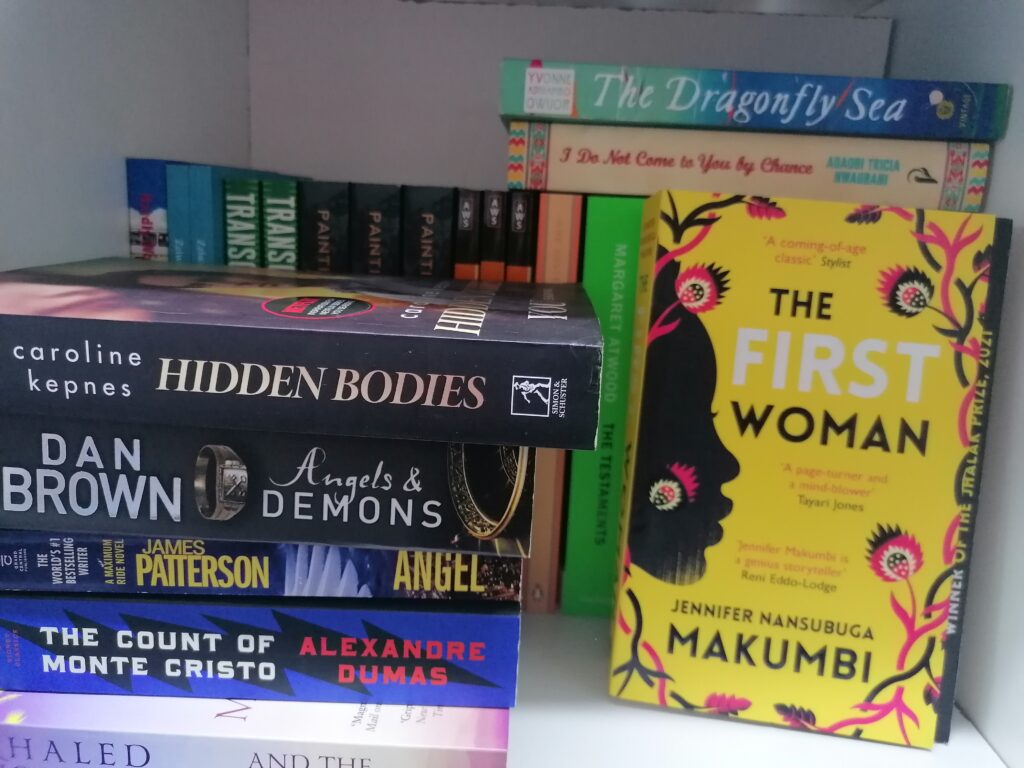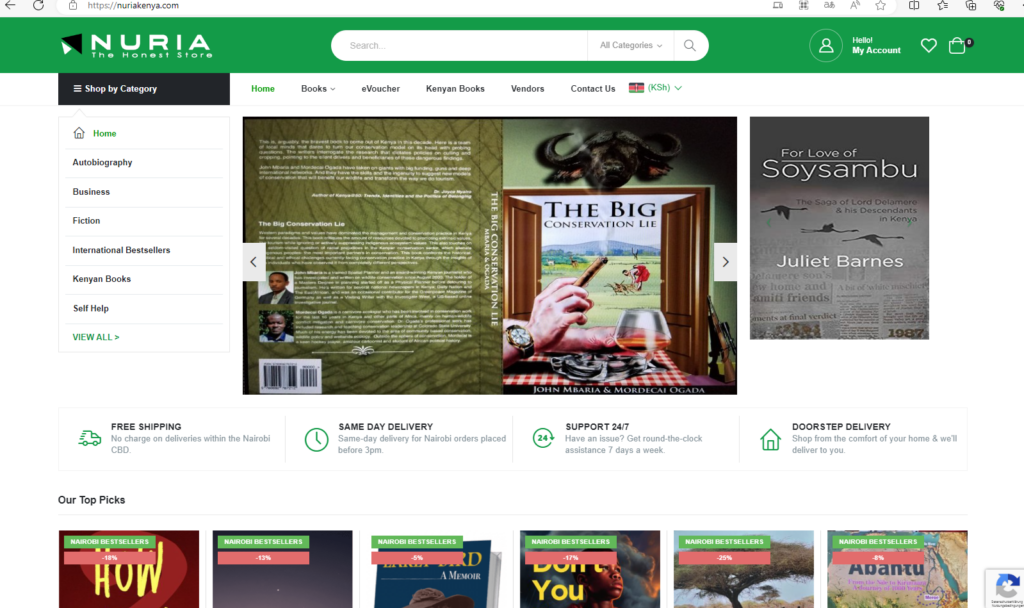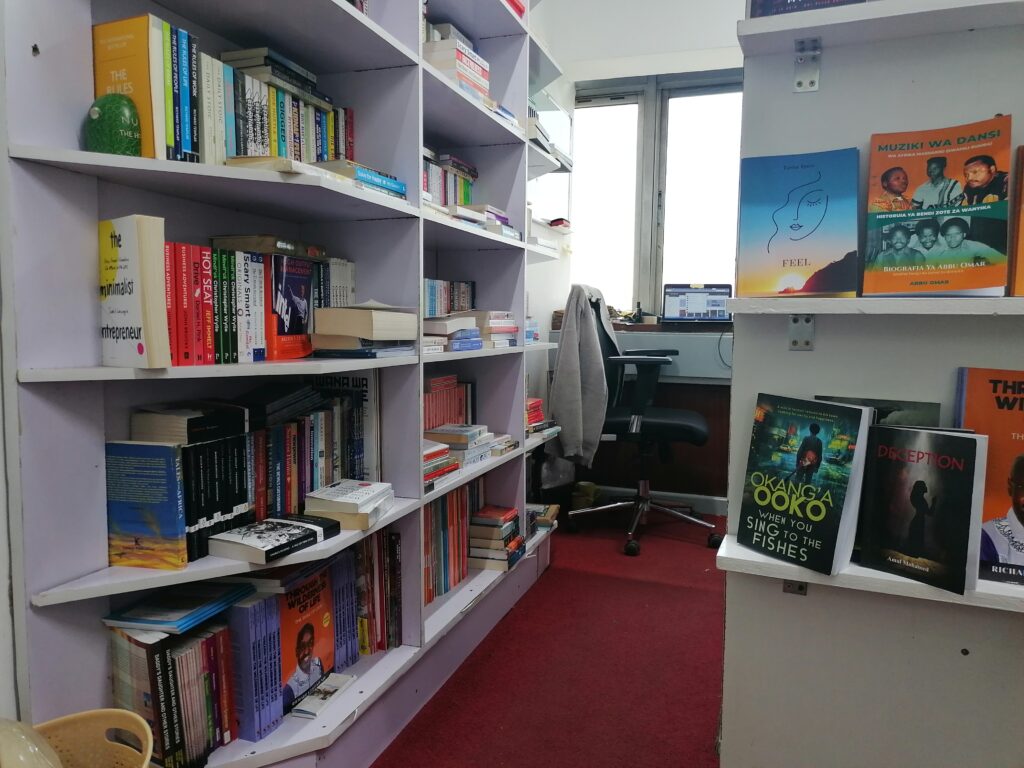
Nuria Book Store – Customers First! Behind the scenes of one of Africa’s biggest Online Bookstores_ english/deutsch
In the centre of Nairobi, the Central Business District CBD, a small bookstore is hidden on the top floor of an office tower. No one comes here by chance. It is not a normal bookstore either, but the headquarters of Nuria. A mixture of bookstore, warehouse and office. Through the panoramic windows you can see the whole city. The phones are ringing off the hook. Customer conversations, orders, problems and solutions. Nuria is not just anyone in Kenya. It is the largest online bookshop and reseller in East Africa.
In a country where Amazon has yet to gain a foothold, it’s something of a fulfilment for all book enthusiasts who want to order books from home and have them delivered. Over 900 authors who market their books themselves also rely on Nuria. For them, Nuria has installed a simple self-marketing tool within the Nuria website. Online sales of books are reported in real time. Transparency is therefore a top priority.
I wanted to find out why Nuria has been able to become so successful and what the big challenges are in the Kenyan book and sales market. Founder and CEO, Abdullahi Bulle was there and took his time in all the hustle and bustle.
From Hans Hofele

HH: You wouldn’t expect a bookstore on 11th floor. But Nuria is not a usual book store, is it? It’s a successful online bookstore. How come that you deal with books?
Abdullahi Bulle (AB): Before I started with books, I was involved in other businesses. I used to sell spare parts and tires from 2012 on. But I am a banker, an ex-banker. The online business I did on weekends. I also had a shop, selling fresh squeezed juices. Later, I distributed milk. My interest in books started from 2014/2015 on. I carried books to work; local and imported. My colleagues then begun to develop an interest in my books. I lent them out. Eventually, my colleagues said, “Instead of borrowing from you, sell to us!” That’s when I created a Facebook page in 2015. After some research, I started a website, the first online book selling website in Kenya. I had a small area for storing the books at first that did not cost much in rent. Then I hired someone to promote and sell the books. We are indeed the very first online book shop in Kenya.
HH: You have a very sophisticated distributing and customer orientated system. Authors get immediate response if a book is sold – online. This looks very transparent. A key to success?
AB: When I started selling international books, I imported them from the UK. Kenya is an English speaking country so we sell mostly English books. But from the beginning we had books by self-published authors. They have a problem: where to sell? The bigger book stores often don’t pick them. And when they take books to traditional book stores it takes a lot of time before they get a response if the book is sold or not. I saw a chance with them.
So I bought a plug in, a software, where now self-published authors can register on a platform. Their books can be displayed with graphics; book cover, brief description of the book and a summary. Then it goes online on our website. From then on, everything which happens to that book, the author is aware. It’s a market inside the website. At the moment, we have about 900 self-published authors from East Africa and the diaspora on our website: Kenya, Uganda, Ethiopia, Tanzania, Rwanda, Burundi and even from Nigeria and Zimbabwe. We are now the biggest online bookshop in East Africa. All have the benefit from this centralized system unless they go to a publisher.

In Kenya, as in many other African countries, distribution is the biggest challenge. And we are talking of precise addresses, post office boxes, security, distance, just to be specific. These are the problems that have so far prevented the big players from outside, such as Amazon, from entering the African market. Goods, to be effective and save costs, are delivered pragmatically. The carpet or mattress is brought to its destination by matatu, passenger minibus, or within localities by cab or motorcycle (boda boda). The cell phone plays a big role. MPESA, the telephone payment service as well. The supplier tells the security guard, the security guard tells the customer. The regular postal service traffic like in the West is mostly used only for professional goods traffic and is relatively expensive. So it is also a great opportunity for local companies like Nuria to use this home advantage for themselves. Nuria mainly supplies the greater Nairobi area with its more than 10 million inhabitants. But also beyond.
HH: Talking about delivery and distribution. Kenya itself is a big country. How do you manage to deliver those books. Sending by post isn’t cheap. Is it?
AB: We offer same day delivery in Nairobi, if the books are ordered until 3pm. We have our own Boda Boda riders. They bring the books directly to our customers. It will cost you around 2 USD. A city like Embu, which is two hours away, is next day delivery. Sending by Post is not efficient because of our address problems. Also the put down at the door doesn’t work here.
HH: Sounds like a good system. Are you afraid of the arrival of Amazon one day?
AB: It will definitely be a challenge! They have the financial muscle and system. We trust in the loyalty of our customers though. We also know we can’t keep all the customers to ourselves but I believe we have a good system for our clients. There is another online seller, Jumia, which sells goods, like a warehouse and they are on the break even. They will take companies over. They did that in other countries like Dubai. For them, existing systems are of interest definitely. But Kenya, like Nigeria is a brutal market. People are loyal to price, not brands.
An example of a successful Kenyan brand you may already be aware of is Safaricom which is the biggest telecommunication company in Africa. Other competitors like Airtel and Telkom are not as successful here. This all boils down to one reason; Safaricom is very innovative and an example of their innovativeness is MPESA. Safaricom’s revenue is about 1 Billion Dollar yearly. You have to be excellent and it works.

HH: What I discovered since my first visit to Kenya are the book prices. They seem to be very expensive to me with a new paperback going for an average price of 1,500 ksh. Not every Kenyan can afford them. What’s the reason behind this?
AB: The production cost of books is very high. Most of the factories are in China and India. In Kenya, we currently don’t have any paper industry. All machines have to be imported and they are very expensive. Before Covid, imported books had been slightly cheap, but now the exchange rate causes higher prices, also transport and taxes. I can buy a book in the UK or US for 2 USD but by the time it arrives here, it’s 7 USD. It would be way cheaper if we produced here but the focus on printing is not on books but on billboards or magazines. Penguin Random House produces books in South Africa, but not here. It would be good if they come to Kenya also. They have an office here but no production.
HH: What are Kenyans reading? More Non-fiction or Fiction?
AB: They love political books. Autobiographies, Memoirs, followed by Kenyan fictional books then Self-Help books and children’s books. The international books are led by fiction and self-help books.
HH: Where do you see yourself in five years?
AB: Oh…tricky! But I see Nuria having more branches in the future and we will definitely reduce the costs of delivery. But this is not so easy, you need more capital. To be physically in other cities, you need manpower and money. The marketing is also important. We hopefully have more employed people in Kenya by that time because the more people have regular work, the more they spend on things like books. We will probably have more authors, maybe from 900 now to 10,000 and we will have our own publishing house. But we will grow slowly, not like a rocket. It’s not healthy because we never know what happens next in the market.
We had our inaugural festival last year, the Nuria Nairobi Book Festival and next year hopefully, our 2nd edition, where we can bring together Kenyan authors and readers. This is also something we want to do more. We also started Pop-ups or tours to the rest of the country like we did in Kisumu recently. This engagement is also important even if the biggest amount of readers are in Nairobi, but we have a big country. Most importantly, we should not risk our core business, and this is selling and distributing books from Nairobi.
HH: Thank you for your time!

Edited by Lorna Likiza
copyright: cultureafrica 2023
DEUTSCH
Im Zentrum Nairobis, dem Central Business District CBD, versteckt sich im oberen Stockwerk eines Office Towers ein kleiner Buchladen. Niemand kommt hier zufällig vorbei. Es ist auch kein normaler Buchladen sondern die Zentrale von Nuria. Eine Mischung aus Buchladen, Lager und Büro. Durch die Panoramafenster sieht man die ganze Stadt. Die Telefone gehen pausenlos. Kundengespräche, Bestellungen, Probleme und Lösungen. Nuria ist nicht irgendwer in Kenia. Es ist der größte Online Bookshop und Reseller Ostafrikas. In einem Land, in dem Amazon noch nicht Fuß fassen konnte, etwas wie die Erfüllung aller Buch-Enthusiasten, die von zuhause Bücher bestellen und beliefert werden wollen. Über 900 Autor:innen, die ihre Bücher selbst vermarkten, vertrauen ebenfalls auf Nuria. Für sie hat Nuria ein einfaches Selbstvermarktungstool innerhalb der Nuria Website installiert. Online-Verkäufe der Bücher werden in Echtzeit mitgeteilt. Transparenz wird also groß geschrieben. Wieso Nuria so erfolgreich werden konnte und was die großen Herausforderungen im kenianischen Buch- und -Vertriebsmarkt sind, das wollte ich herausfinden. Der Gründer und Geschäftsführer Abdullahi Bulle ist da und nimmt sich in all dem Trubel die Zeit.
From Hans Hofele

HH: Im 11. Stock in der Moi Avenue würde man keinen Buchladen erwarten. Aber Nuria ist doch kein gewöhnlicher Buchladen, oder? Es ist ein erfolgreicher Online-Buchladen. Wie kommt es, dass du mit mit Büchern handelst?
Abdullahi Bulle (AB): Bevor ich mit Büchern angefangen habe, war ich in andere Geschäfte involviert, angefangen mit Ersatzteilen und Reifen, das war ab 2012. Aber ich bin Banker, ein ehemaliger Banker, das Online-Geschäft habe ich an den Wochenenden gemacht. Ich hatte auch einen Laden, in dem ich frisch gepresste Säfte verkaufte. Später habe ich dann Milch vertrieben. Mein Interesse an Büchern begann ab 2014/2015. Ich nahm Bücher mit zur Arbeit, lokale Bücher und importierte. Meine Kollegen begannen sich auch für meine Bücher zu interessieren. Ich habe sie ausgeliehen und dann angefangen, sie zu verkaufen. Die Kollegen sagten: “Anstatt von dir zu leihen, verkaufe an uns!” Ich erstellte eine Facebook-Seite, das war 2015. Nach einigen Recherchen startete ich eine Website, die erste Online-Buchverkaufs-Website in Kenia. Ich hatte einen kleinen Raum, um die Bücher zu lagern, und wenig Miete. Dann stellte ich einen Mann ein, um die Bücher zu bewerben und zu verkaufen. Wir sind der allererste Online-Buchladen in Kenia.
HH: Du hast ein sehr ausgeklügeltes, kundenorientiertes Vertriebssystem. Kunden wie selbstverlegte Autoren oder Verkäufer erhalten sofort eine Rückmeldung, wenn ein Buch verkauft wurde – online. Das wirkt sehr transparent. Ein Schlüssel zum Erfolg?
AB: Als ich anfing, internationale Bücher zu verkaufen, habe ich sie aus Großbritannien importiert. Kenia ist ein englischsprachiges Land, also verkaufen wir hauptsächlich englischsprachige Bücher. Aber von Anfang an hatten wir auch Bücher von kenianischen Autor:innen im Eigenverlag. Die haben ein Problem: Wo sollen sie verkaufen?

In Kenia ist, wie in vielen afrikanischen Ländern, die Distribution die größte Herausforderung. Genaue Adressen, Postfächer, Sicherheit, große Distanzen. Alles Probleme, die die großen Player von außerhalb wie Amazon bisher abgehalten haben, in den afrikanischen Markt einzusteigen. Waren werden, um effektiv zu sein und Kosten zu sparen, pragmatisch geliefert. Der Teppich oder die Matratze wird vom Matatu, dem Personenkleinbus oder innerhalb von Ortschaften per Taxi oder Motorrad (Boda Boda) ans Ziel gebracht. Das Mobiltelefon spielt eine große Rolle, MPESA, der Telefon-Bezahldienst ebenso. Der Lieferant sagt dem Wachmann Bescheid, der Wachmann dem Kunden, der Kundin. Der reguläre Postdienstverkehr wie im Westen wird meist nur für den professionellen Warenverkehr genutzt und ist verhältnismäßig teuer. Es ist also auch die große Chance für einheimische Firmen wie Nuria, diesen Heimvorteil für sich zu nutzen. Nuria beliefert hauptsächlich im Großraum Nairobi mit seinen über 10 Millionen Einwohnern. Aber auch darüber hinaus.
HH: Sprechen wir über die Lieferung und Verteilung. Kenia selbst ist ein großes Land. Wie schaffen Sie es, diese Bücher auszuliefern? Der Postversand ist ja nicht billig?
AB: Wir bieten in Nairobi eine Lieferung am selben Tag an, wenn die Bücher bis 15 Uhr bestellt werden. Wir haben unsere eigenen Boda-Boda-Lieferanten. Sie bringen die Bücher direkt zu unseren Kunden. Das kostet etwa 2USD. In einer Stadt wie Embu, die zwei Stunden entfernt ist, erfolgt die Lieferung am nächsten Tag. Der Versand mit der Post ist wegen unserer Adressprobleme nicht effizient. Auch das Ablegen an der Tür funktioniert hier nicht.
HH: Das klingt nach einem guten System. Hast du Angst vor der Ankunft von Amazon eines Tages?
AB: Es wird auf jeden Fall eine Herausforderung sein! Sie haben die großen Muskeln, das Geld, das System. Wir vertrauen auf die Loyalität unserer Kunden. Wir können wohl nicht alle Kunden behalten, aber wir haben ein gutes System für unsere Kunden. Es gibt einen anderen Online-Verkäufer, Jumia, der Waren verkauft, wie ein Lagerhaus, und sie sind am Rande der Gewinnzone. Sie werden Unternehmen übernehmen. Das haben sie in anderen Ländern wie Dubai getan. Für sie sind die bestehenden Systeme auf jeden Fall interessant. Aber Kenia ist, wie Nigeria, ein brutaler Markt. Die Menschen sind dem Preis treu, nicht den Marken.
Ein Beispiel für eine erfolgreiche kenianische Marke ist SafariCom, das größte Telekommunikationsunternehmen in Afrika. Eine kenianische Marke. Andere Wettbewerber wie AirTel und Telcom sind hier nicht so erfolgreich. Ein Grund dafür: SafariCom ist eine kenianische Marke und sehr innovativ, wie ihre MPESA-Innovation. SafariComs Einnahmen belaufen sich auf etwa 1 Milliarde Dollar. Man muss hervorragend sein, und das funktioniert.

HH: Was mir seit meinem ersten Besuch in Kenia aufgefallen ist, sind die Buchpreise. Sie scheinen mir sehr hoch zu sein, ein neues Taschenbuch kostet durchschnittlich 1500 Ksh, umgerechnet 10 Euro. Nicht alle Kenianer:innen können sie sich leisten.
AB: Die Produktionskosten für Bücher sind sehr hoch. Die meisten Fabriken befinden sich in China und Indien. In Kenia haben wir keine Papierindustrie. Alle Maschinen müssen importiert werden, und sie sind sehr teuer. Vor Covid waren importierte Bücher etwas billiger, aber jetzt sorgt der Wechselkurs für höhere Preise, auch für Transport und Steuern. Ich kann ein Buchin Großbritannien oder in den USA für 2 USD kaufen, aber wenn es hier ankommt, kostet es 7 USD. Es wäre viel billiger, wenn es hier produziert würde, aber der Schwerpunkt der Druckproduktion liegt nicht auf Büchern, sondern auf Werbebannern oder Zeitschriften. Die Qualität des einheimischen Buchdrucks lässt auch zu Wünschen übrig.Penguin Randomhouse produziert Bücher in Südafrika, aber nicht hier. Es wäre gut, wenn sie auch nach Kenia kämen. Sie haben hier ein Büro, aber keine Produktion.
HH: Was lesen die Kenianer:innen? Eher Sachbücher oder Belletristik?
AB: Sie lieben politische Bücher. Autobiografien, Memoiren, gefolgt von kenianischen Sachbüchern, dann Selbsthilfebücher und Kinderbücher. Bei den internationalen Büchern stehen Belletristik und Selbsthilfebücher an erster Stelle.
HH: Wo siehst du dich selbst in fünf Jahren?
AB: Oh… das ist schwierig! Wir sehen uns mit mehr Filialen in der Zukunft, wir werden die Kosten für die Lieferung reduzieren. Aber das ist nicht so einfach, man braucht mehr Kapital.
Auch das Marketing ist wichtig. Wir hoffen, dass wir mehr Menschen in Kenia beschäftigen können, denn je mehr Menschen eine feste Arbeit haben, desto mehr geben sie für Dinge wie Bücher aus. Wir werden mehr Autoren haben, vielleicht von jetzt 900 auf 10.000, und wir werden unseren eigenen Verlag haben. Aber wir werden langsam wachsen, nicht wie eine Rakete. Das ist nicht gesund, weil wir nie wissen, was als nächstes auf dem Markt passiert.
Letztes Jahr hatten wir unser Festival, das Nuria Nairobi Book Festival, und nächstes Jahr hoffentlich unsere nächste Ausgabe, bei der wir kenianische Autoren und Leser zusammenbringen können. Auch das ist etwas, was wir noch mehr tun wollen. Wir haben auch mit Pop-ups oder Touren aufs Land begonnen, wie wir es in Kisumu getan haben. Dieses Engagement ist ebenfalls wichtig, denn die meisten Leser sind in Nairobi, aber wir haben ein großes Land. Aber wir sollten unser Kerngeschäft nicht aufs Spiel setzen, und das ist der Verkauf und Vertrieb von Büchern von Nairobi aus.
HH: Ich danke Ihnen für Ihre Zeit!
Mitarbeit: Lorna Likiza
copyright: cultureafrica 2023


